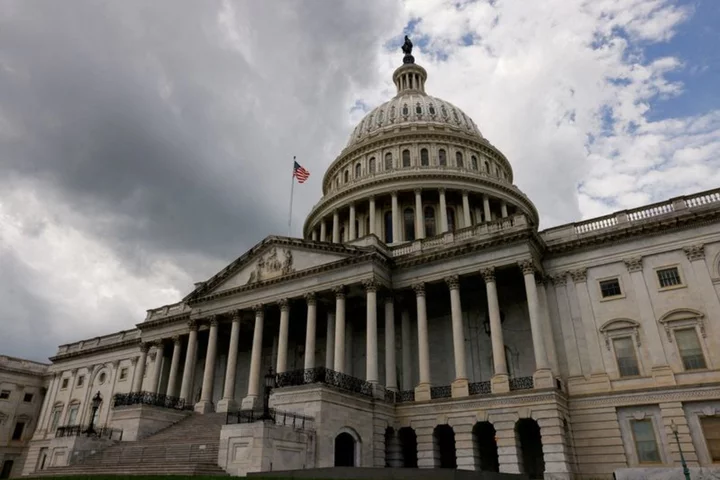By Richard Cowan and Moira Warburton
WASHINGTON The U.S. Congress is facing growing calls to find a way to stem rising budget deficits and debt following this month's warning by Moody's that political dysfunction could lead it to lower the federal government's credit rating.
There is no rocket science to the three basic choices for grappling with a national debt that has doubled in just the last decade and stands at $33.7 trillion, around 124% of GDP: raise taxes, cut spending or do a combination of the two.
That has led some lawmakers to call for a commission to do the heavy lifting of coming up with realistic approaches to addressing the ballooning debt, a growing concern now that interest rates have risen, producing a jaw-dropping $659 billion in payments just on the national debt in fiscal year 2023, according to the Treasury Department.
"A fiscal commission is direly needed," Republican Senator Mike Braun, a Budget Committee member, said in an interview.
Braun said deficits and debt could become an important issue in the 2024 elections, especially as "the heavy weight of paying interest will start crowding out all the other things," referring to the cost of federal programs ranging from defense to homeland security.
Since 2013, the national debt has more than doubled from $16.7 trillion. During that time, Republicans have enacted a major bill to cut taxes that has reduced revenues, while both parties have backed higher spending, in part in response to the COVID-19 pandemic. Democrats have also worked to expand social safety net programs.
The result is that Moody's ratings agency this month lowered its credit rating outlook on the U.S. to "negative" from "stable." High interest rates would keep driving borrowing costs higher, Moody's said.
That followed Fitch ratings agency, which in August downgraded the U.S. government's top credit rating to AA+ from AAA, citing the standoff in Congress that brought the government close to defaulting on its debts.
"Our fiscal challenges are serious but also solvable and a bipartisan commission is the best approach," said Michael Peterson, CEO of the Peter G. Peterson Foundation, a non-partisan group that works to raise awareness of long-term U.S. fiscal problems.
It circulated ideas from a dozen experts on how a commission could offer up solutions for taming deficits and debt.
For example, Mark Zandi, chief economist of Moody’s Analytics, which operates independently from its parent company's ratings business, pitched a new tax on greenhouse gas emissions and changing the government's formula for determining cost-of-living adjustments for federal benefit programs.
Economists Dana Peterson and Lori Esposito Murray of the Conference Board, a non-profit business research group, suggested a 2043 goal of reducing debt-to-GDP to 70% through tax increases and spending cuts. Other recommendations included subjecting high-income earners to more Social Security taxes and gradually raising the age for full retirement benefits to 69 from the current 67.
BIPARTISAN BILL
Democratic Senator Joe Manchin and Republican Senator Mitt Romney, both of whom are due to retire from Congress at the end of next year, have sponsored a bill that would create a bipartisan commission that would likely conclude work in 2025. A similar bipartisan bill is pending in the House of Representatives.
Congress has been consumed for much of the year by fights over the approximately $1.6 trillion in annual spending on "discretionary" programs, such as defense, homeland security and some social safety net benefits. This comprises only about one-third of overall government spending.
That ignores the biggest drivers of spending, "mandatory" programs such as Social Security and Medicare.
But the idea raises red flags to progressives. A commission, said independent Senator Bernie Sanders, who caucuses with Democrats, would simply be "a backdoor way to get into cutting Social Security."
Sanders embraced lifting the cap on taxable income to extend the life of the Social Security trust fund.
Several lawmakers said a commission could succeed only if it had the power to force Congress to act on its recommendations, which could in turn make Republicans either go along or scrap their long-held opposition to tax hikes, if such measures are suggested.
(Reporting by Richard Cowan and Moira Warburton; editing by Grant McCool)









